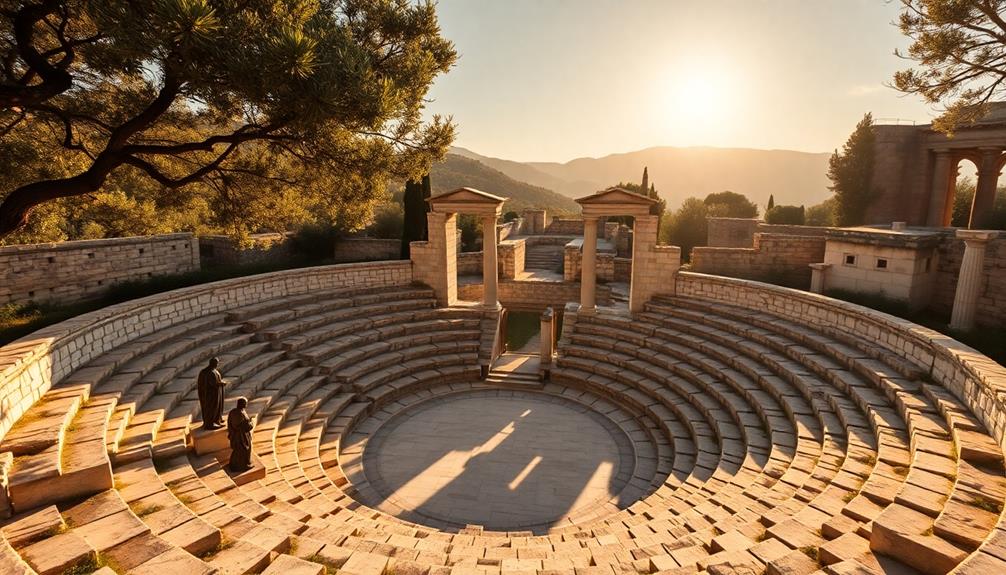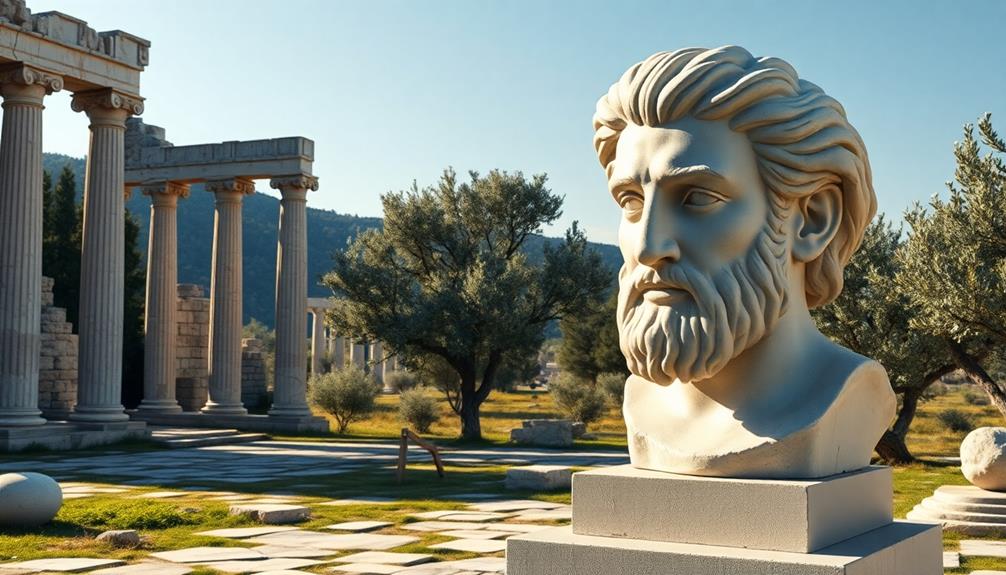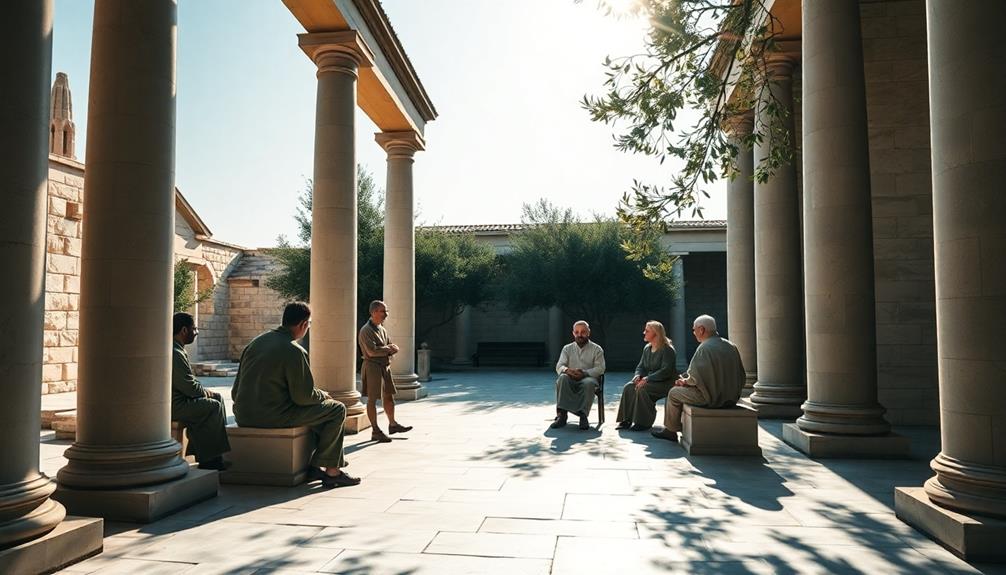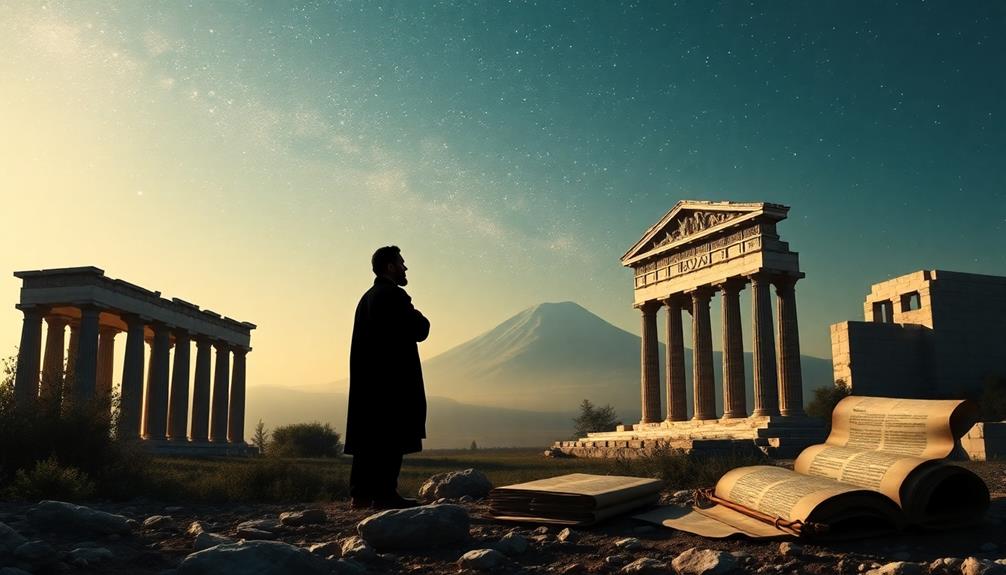You're missing a wealth of knowledge from Ancient Greece, where much of the philosophical discourse remains lost. Around 85% of Aristotle's works are gone, and many other key figures like Anaximander and Diogenes have left only fragments. These gaps limit your understanding of crucial concepts in ethics, metaphysics, and the foundations of Western thought. The lost texts reflect a rich tapestry of ideas that could reshape your view of philosophy. If you ponder what these ancient thinkers contributed, you'll find a deeper connection to the essence of philosophical inquiry and its lasting impact on our world.
Key Takeaways
- Only 31 of approximately 200 works attributed to Aristotle survive, limiting insights into his philosophies on aesthetics and ethics.
- Many ancient philosophers, like Anaximander and Democritus, have fragmented works that obscure their original ideas and contributions.
- The entire text of Cicero's "Hortensius" is lost, creating gaps in understanding philosophical discourse during his time.
- Recovery efforts for lost texts could reshape our understanding of ethical frameworks from ancient philosophers, enriching contemporary philosophical thought.
- The search for lost philosophical wisdom highlights the fragility of human knowledge and the importance of preserving intellectual heritage for future generations.
Survival of Ancient Texts

The survival of ancient texts is a fascinating interplay between chance and effort. You might be surprised to learn that only a small percentage of ancient philosophical works have survived, with merely 31 of the approximately 200 texts attributed to Aristotle still extant.
The preservation of these surviving works largely hinges on the diligent efforts of Arab scholars and Medieval scribes, who meticulously copied and transmitted knowledge through generations. This effort is essential; without it, many voices from antiquity would be lost to time.
However, the reality is that numerous ancient philosophical works exist only as fragments or references in later writings. This situation complicates your understanding of the original ideas and arguments proposed by thinkers like Aristotle.
Among the significant Lost Works are Aristotle's second book of Poetics and Cicero's dialogue, Hortensius. These texts are critical for grasping the intricacies of ancient philosophical thought. The recovery of such lost texts could reshape your comprehension of ancient philosophies, revealing deeper connections and coherence within Presocratic worldviews.
As you explore this subject, it becomes evident just how much we stand to gain from the texts that have survived and those we've lost.
The Lost Works of Aristotle

You might be surprised to learn that only 31 of the approximately 200 works attributed to Aristotle have survived, leaving a significant gap in his philosophical legacy.
The loss of key texts, like the second book of "Poetics," means we miss out on deeper insights into his thoughts on aesthetics and ethics.
With much of the historical context being speculative, reconstructing Aristotle's complete vision remains a challenging task.
Incomplete Philosophical Legacy
Among the philosophical giants of ancient Greece, Aristotle stands out not only for his influential ideas but also for the substantial gaps in his legacy due to lost works. Of approximately 200 works attributed to him, only 31 have survived, leading to an incomplete philosophical legacy that limits our understanding of his all-encompassing system.
Several notable ancient texts by Aristotle are missing, which leaves us questioning what insights we've lost:
- Second Book of Poetics – Essential for understanding his theories on aesthetics.
- On the Pythagoreans – Important for insights into ethics and mathematics.
- Protrepticus – A work that could illuminate his views on the nature of philosophy.
- Treatises on Politics and Metaphysics – Key areas where his thoughts remain largely speculative.
Cicero famously described Aristotle's dialogues as a "river of gold," emphasizing the richness of ideas that could have further shaped philosophical discourse.
The absence of these texts creates significant gaps in knowledge regarding his views on metaphysics, politics, and natural sciences, leaving you to ponder the full scope of Aristotle's intellectual contributions.
Speculative Historical Context
Lost works of Aristotle paint a picture of a philosophical landscape that remains tantalizingly out of reach. Despite around 200 texts attributed to him, only 31 survive, leaving significant gaps in your understanding of his contributions. Imagine the insights contained in the lost second book of "Poetics," "On the Pythagoreans," and "Protrepticus." Cicero once described Aristotle's dialogues as a "river of gold," hinting at the richness these texts might hold.
| Lost Works | Potential Insights |
|---|---|
| Second Book of Poetics | Ethical dimensions of poetry |
| On the Pythagoreans | Metaphysical ideas on mathematics |
| Protrepticus | Persuasive ethics and life guidance |
| Other Dialogues | Broader reflections on reality and existence |
The historical context of these lost works remains speculative, limiting your direct insights into Aristotle's philosophical evolution. If recovered, these texts could reshape modern interpretations of ethics, logic, and natural sciences, revealing new dimensions of his intellectual legacy. The absence of these works leaves you yearning for a deeper understanding of ancient authors and their profound insights.
Other Philosophers' Missing Texts

Many ancient philosophers have had their works slip through the cracks of history, leaving us with only fragments that hint at their profound ideas. Without their complete texts, you miss out on a fuller understanding of their philosophies. Here are a few notable examples:
- Anaximander – His fragments provide glimpses into his cosmological theories, but you can't grasp the full scope of his thoughts.
- Democritus – Known for his ideas on atomism, much of his ancient work is also fragmented, leaving you wanting more clarity on his contributions.
- Cicero's "Hortensius" – This dialogue, which once explored the nature of philosophy, is entirely lost, obscuring the philosophical discourse of his time.
- Pythagoras – Despite his influence on mathematics and philosophy, his original texts are completely missing, preventing you from fully understanding his views on numbers and reality.
Additionally, the writings of Diogenes and Zeno of Elea haven't survived, limiting insights into cynicism and the paradoxes of motion and plurality.
Instead, you're left with fragments of Timon's works, which further complicates any thorough understanding of these philosophers' legacies.
Importance of Recovering Lost Works

Recovering lost works of ancient philosophers can reveal valuable insights into their thoughts and ethical frameworks.
By filling in the historical gaps left by missing texts, you can reshape your understanding of their contributions and worldviews.
This quest not only enriches your grasp of philosophy but also preserves an essential part of our intellectual heritage for future generations.
Uncovering Presocratic Insights
Uncovering the insights of Presocratic philosophers holds immense potential for deepening our understanding of early philosophical thought.
The recovery of lost works can illuminate the ideas of thinkers like Anaximander and Democritus, whose fragments limit our grasp of their all-encompassing worldviews.
By pursuing these texts, you can access a wealth of knowledge that shapes our understanding of existence and the cosmos.
Here are four key reasons to prioritize the recovery of these lost works:
- Expanded Knowledge: Recovered texts could provide clarity on Pythagoras and the Pythagoreans, revealing their mathematical and philosophical contributions.
- Ethical Frameworks: Dialogues like Cicero's *Hortensius* may contain discussions that reshape our views on ethics and the nature of knowledge.
- Cultural Context: Understanding Presocratic thought deepens appreciation for the roots of Western philosophy, enriching contemporary discourse.
- Preserving Heritage: The search for lost works highlights the fragility of our intellectual heritage and the urgent need to safeguard ancient texts for future generations.
Filling Historical Gaps
How can we fully grasp the depth of ancient philosophy without addressing the significant gaps in our historical knowledge? The recovery of lost works, like Aristotle's second book of Poetics and Protrepticus, is essential for enhancing our understanding of ethics and metaphysics. With only 31 of the approximately 200 works attributed to Aristotle surviving, we face considerable limitations in comprehending his extensive philosophical vision.
Moreover, the fragmented nature of Presocratic thought, resulting from these lost works, constrains our current interpretations of early inquiries into reality and existence. Imagine how uncovering these texts could revolutionize our insights into ethical dimensions, potentially reshaping established narratives about ancient thinkers.
Efforts to retrieve ancient manuscripts reflect a broader desire to reclaim and preserve our intellectual heritage. This pursuit is fundamental for grasping the foundational principles of Western philosophy.
In recovering lost works, we not only fill historical gaps but also breathe new life into the philosophical discourse of ancient Greece, enriching our understanding of the past and its relevance to today. Embracing this endeavor could lead to profound revelations about the thinkers who laid the groundwork for modern thought.
Cultural and Historical Impact

The cultural and historical impact of lost philosophies from ancient Greece is profound, shaping our understanding of early thought. The mystery surrounding these lost works raises important questions about how we interpret historical narratives. Here are four key aspects of this impact:
- Cultural Heritage: The absence of significant texts threatens our intellectual legacy, emphasizing the fragility of human knowledge.
- Fragmented View: Without these writings, our understanding of early thinkers remains incomplete, making it vital to recover lost ideas to construct a coherent narrative.
- Historical Interpretations: Future discoveries could reshape our perspectives on Presocratic ideas, challenging long-held beliefs within Western philosophy.
- Desire for Understanding: The quest for these texts reflects a deeper yearning to engage with the foundational ideas that have historically influenced philosophical discourse.
Recovering these ancient philosophies isn't just about filling gaps; it's about preserving our cultural heritage and enriching the dialogue around Western thought.
Each lost text might hold insights that could transform our understanding of ancient philosophy, making the journey of recovery essential for both scholars and enthusiasts alike.
Foundations of Ancient Greek Philosophy

Ancient Greek philosophy stands as a cornerstone of Western thought, rooted in the inquiries and ideas of remarkable thinkers. At its foundations, this philosophy sought to understand the nature of existence and our place within it. Key figures like Thales proposed water as the fundamental substance of the cosmos, opening the door to rational explanations rather than mythological ones.
Democritus took this further by introducing the concept of atoms as the building blocks of matter. Socrates revolutionized philosophical inquiry through dialogue, emphasizing ethics and the pursuit of the best life by exposing contradictions in people's beliefs.
His student, Plato, expanded on these ideas, crafting philosophical dialogues that covered ethics, politics, metaphysics, and epistemology, shaping the foundational frameworks we still reference today. Aristotle, in turn, built upon Plato's teachings, authoring extensive treatises that explored the natural world, ethics, and politics, influencing countless generations.
The Presocratic philosophers, like Heraclitus and Parmenides, laid the groundwork for this shift towards rational inquiry, moving away from mythological explanations. Together, these thinkers established the foundations of ancient Greek philosophy, profoundly impacting our understanding of the world.
Presocratic Thought and Its Challenges

Presocratic thought represents a pivotal shift in philosophical inquiry, moving from mythological narratives to rational explanations of the cosmos. Thinkers like Thales and Heraclitus laid the foundation for future philosophy, challenging the status quo with naturalistic frameworks.
However, you'll encounter several significant challenges when exploring their ideas:
- Fragmentation of Texts: Most of what's understood comes from later references, leaving many original works lost or incomplete.
- Interpretive Difficulties: The fragments can be cryptic, making it hard to reconstruct coherent philosophical arguments.
- Historical Context: These thinkers operated in a time when philosophy was just beginning, complicating our understanding of their contributions relative to one another.
- Critical Labels: The term "Presocratic" implies a hierarchy that undervalues these philosophers' significance, overshadowing their contemporaneous impact.
The loss of many Presocratic works hinders our grasp of early philosophical concepts. Recovery efforts could reshape modern interpretations, providing deeper insights into their views on ethics, reality, and the cosmos.
Engaging with these challenges allows you to appreciate the richness of early philosophical thought and its ongoing relevance.
Influence of Socratic Philosophy

While exploring the evolution of Western philosophy, you'll find that Socratic philosophy plays an essential role in shaping ethical inquiry. Socrates, through the dialogues of Plato and accounts by Xenophon, emphasized the importance of self-examination and moral questioning. His method involved asking probing questions to expose contradictions in beliefs, fostering critical thinking that remains relevant today.
Socrates didn't write any texts himself, but his teachings laid the groundwork for ethical theories that influenced both ancient and modern philosophy. His focus on morality and virtue helps us understand what constitutes a good life, deeply impacting subsequent philosophical discourse.
Furthermore, Socrates' insistence on recognizing one's own ignorance as wisdom stresses the value of dialogue, a principle that resonates in contemporary education.
Despite his profound influence, Socrates faced charges of impiety and corrupting the youth of Athens, leading to his execution. This illustrates the tension between philosophical inquiry and societal norms, highlighting the challenges philosophers often encounter.
Ultimately, Socratic philosophy continues to inspire you to question and reflect, encouraging a lifelong pursuit of wisdom in your own life.
Ongoing Search for Ancient Wisdom

The quest for lost philosophical wisdom continues to captivate scholars and enthusiasts alike. You might see this ongoing search as an intellectual treasure hunt, where each fragment uncovered has the potential to reshape our understanding of the ancient world. Many historians focus on Aristotle's writings, piecing together fragments and references to fill in the gaps of his ideas.
Consider these key aspects of this search:
- Rediscovery of Texts: Recovering lost works could enrich our knowledge of Presocratic philosophers, who remain elusive due to the scarcity of their original texts.
- Intellectual Heritage: Efforts to retrieve these writings reflect a broader desire to reclaim our shared intellectual heritage.
- Historical Context: The narrative surrounding lost works highlights the fragility of human knowledge throughout history.
- Philosophical Continuity: This ongoing pursuit emphasizes our continuous quest to understand human thought and experience.
As you explore this quest, remember that each discovery not only fills in historical gaps but also deepens our appreciation for the complexity of ancient philosophical discourse. Your journey through these lost philosophies can truly enrich your understanding of our intellectual past.
Frequently Asked Questions
How Does Ancient Greek Philosophy Affect Us Today?
Ancient Greek philosophy influences your thinking daily, shaping your ethics, politics, and scientific inquiry. It encourages you to question deeply, pursue knowledge rationally, and engage in meaningful dialogue, fostering critical examination in various aspects of life.
What Are the Three Unsolved Problems of Ancient Greece?
You think you've got it all figured out, right? But the three unsolved problems of ancient Greece are Pythagoreanism's mysteries, Aristotle's missing ethics, and those elusive Presocratic ideas. They're still waiting for your insight.
What Are the Central Problems of Ancient Greek Philosophy?
Ancient Greek philosophy tackles central problems like existence, knowledge, and ethics. You'll explore debates on change versus permanence, the nature of truth, and the essence of a good life through Socratic inquiry and diverse philosophical perspectives.
Why Are Aristotle's Works Lost?
Like fallen leaves in autumn, Aristotle's works slipped away through time. Many were lost due to neglect, destruction, and the focus on his surviving teaching notes, leaving gaps in his profound philosophical legacy you can explore.
Conclusion
In exploring the lost philosophies of Ancient Greece, you realize just how much we've missed. Did you know that around 90% of Aristotle's works are believed to be lost? This staggering statistic highlights the gaps in our understanding of philosophical foundations. Recovering these texts could reshape our perspective on ethics, politics, and science. By delving into these ancient ideas, you not only honor the thinkers of the past but also enrich your own worldview today.









